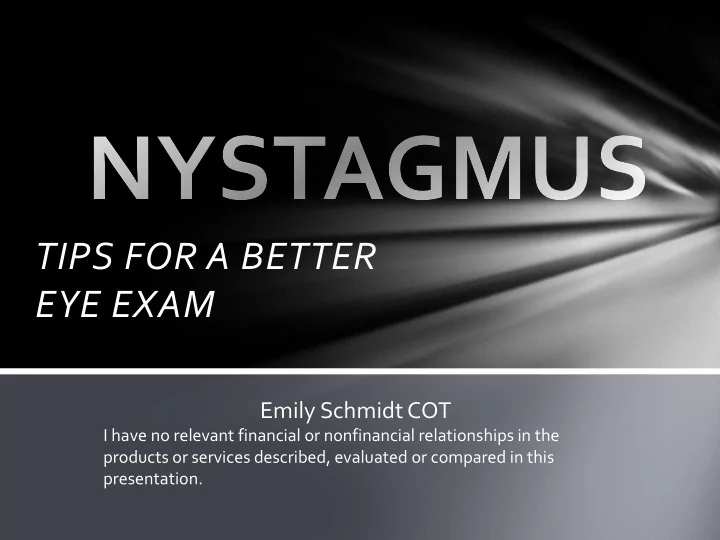

TIPS FOR A BETTER EYE EXAM Emily Schmidt COT I have no relevant financial or nonfinancial relationships in the products or services described, evaluated or compared in this presentation.
HOW COMMON IS NYSTAGMUS? • A. 1 in 1,000 • B. 1 in 3,000 • C. 1 in 5,000 • D. 1 in 10,000 The answer may surprise you…
A. 1 in 1,000 According to the 2010 census the Minneapolis, St Paul metropolitan area population was 3,759,978 and 7.139 billion in the world. This means there are 3,760 people in the twin cities with nystagmus and 7,139,000 worldwide.
NYSTAGMUS GROUPS Sensory Neurological KINDS OF NYSTAGMUS Congenital Acquired NYSTAGMUS FORMS Manifest Latent Manifest-Latent NYSTAGMUS SUBTYPES 49 different subtypes
Duration Congenital=lifelong 1 exception Spasmus Natans Acquired=??? ASSOCIATED CONDITIONS: CONGENITAL Congenital Cataract Optic nerve hypoplasia Aniridia Severe refractive error Retina coloboma Other optic nerve and retina disorders Albinism (both regular and ocular) Fetal alcohol syndrome Idiopathic…
ASSOCIATED CONDITIONS: ACQUIRED Medication use Vitamin deficiency Trauma Inner ear (vestibular) problems Stroke (most common cause in older people with acquired nystagmus Brain tumor (rare cause of acquired nystagmus) Multiple sclerosis Chiari Malformation NEVER IDIOPATHIC!!!
H OW DOES SOMEONE WITH CONGENITAL NYSTAGMUS SEE THE WORLD???
TYPES OF NYSTAGMUS MOVEMENTS 1. Vertical
1a.Upbeat
1b.Downbeat
1c.Seesaw
2.Torsional/ Rotary
3.Horizontal
3a. Horizontal jerk
Spasmus Natans
WAYS TO CAUSE TEMPORARY NYSTAGMUS Rapid head shaking or spinning Optokinetic drum or the railroad effect
NYSTAGMUS MANAGEMENT METHODS Correct vision with Rx if needed Glasses Contacts Prisms Convergence Null point Surgery Null point Strabismus Muscle/nerve disruption
High minus contacts with high plus glasses Botox Retrobulbar vs individual muscles Acquired: MS, stroke, tumors Side affects: ptosis, diplopia, reduced accommodation Temporary 3-6 months/2-3 months Medications Azopt (Brinzolamide) CN/INS Oral medications-acquired
Management Approach Examples Gabapentin Barbiturates Oral Medications Memantine Alcohol 4-aminopyridine Acetazolamide 3,4-diaminopyridine Brinzolamide (topical) Baclofen Cannabis Clonazepam Valproate Trihexyphenidyl Benztropine Scopolamine Isoniazid Carbamazepine
Nystagmus Type Medication Common Side-Effects Treatment of Not applicable Peripheral Vestibular underlying Nystagmus disorder 4-aminopyridine Dizziness, paresthesias, Downbeat incoordination Nystagmus 3,4-diaminopyridine Dizziness, paresthesias, Clonazepam incoordination Drowsiness, dizziness, incoordination Memantine Lethargy, dizziness, headache Upbeat Nystagmus 4-aminopyridine Dizziness, paresthesias, incoordination Baclofen Drowsiness, dizziness, lethargy
Nystagmus Type Medication Common Side-Effects Torsional Nystagmus Gabapentin Dizziness, incoordination, drowsiness Alcohol Drowsiness, incoordination, vomiting Seesaw Nystagmus Clonazepam Drowsiness, dizziness, incoordination Memantine Lethargy, dizziness, headache Baclofen Drowsiness, dizziness, lethargy Periodic Alternating Nystagmus Memantine Lethargy, dizziness, headache Gabapentin Dizziness, incoordination, drowsiness Acquired Pendular Nystagmus in MS Memantine Lethargy, dizziness, headache Gabapentin Dizziness, incoordination, drowsiness Acquired Pendular Nystagmus in OPT Memantine Lethargy, dizziness, headache Trihexyphenidy Dry mouth, blurred vision, dizziness
MANAGEMENT METHODS SUMMARY All methods can yield similar results Nystagmus may be lessoned but never gone Vision may be improve by up to 4 lines, 1 to 2 is more common, or it may not improved at all Drugs for acquired are mainly used to reduce or stop oscillopsia
THE EXAM… ***LISTEN TO YOUR PATIENT!!!*** Slow down, Slow down, SLOW DOWN!!!!!!!!! Let them use their null point
THE EXAM Always check binocular vision Let them hold the near card where they want Low vision does not equal low IQ Watch out for memorization Not everyone with nystagmus has a latent component
OCCLUDERS Single vs double occluder??? Null point=single occluder Large movement=single occluder
OCCLUDERS Black vs Translucent Translucent patch occluder Clip on occluders Handheld pinhole Clip on pinhole
PHOROPTER VS TRIAL FRAMES Null point=Trial frames Large movement=Trial frames Latent component=Trial frames*** Black occluder lens Pinhole lens Plus lens
SPECIALIZED TESTS OCT, fundus photos, visual field, topography, IOL master, etc… Breath, don’t panic Adjust the machine to the patient Don’t get frustrated Accept that you may not get a perfect test Use comment boxes
THE UNNECESSARY “NECESSARY TESTS ” Ø Non Contact Tonometry Ø Autorefractors 2 Common Patient Surgery Questions ? Can I have LASIK ? Can I have cataract surgery
REFERENES http://www.allaboutvision.com/conditions/nystagmus.htm http://www.ncbi.nlm.nih.gov/pmc/articles/PMC1279675/ http://webeye.ophth.uiowa.edu/eyeforum/tutorials/Nystagmus/ http://www.ncbi.nlm.nih.gov/pmc/articles/PMC1279676/ http://content.lib.utah.edu/utils/getfile/collection/ehsl- nam/id/47/filename/image http://www.aapos.org/terms/conditions/80 http://emedicine.medscape.com/article/1199177-overview#a0101 http://en.wikipedia.org/wiki/Nystagmus RESOURCES FOR PATIENTS American Nystagmus Network (ANN): http://nystagmus.org/new/index.php ANN Facebook Group Nystagmus Network (NN) UK based: http://www.nystagmusnet.org/cms/ Nystagmus United Facebook group
Recommend
More recommend